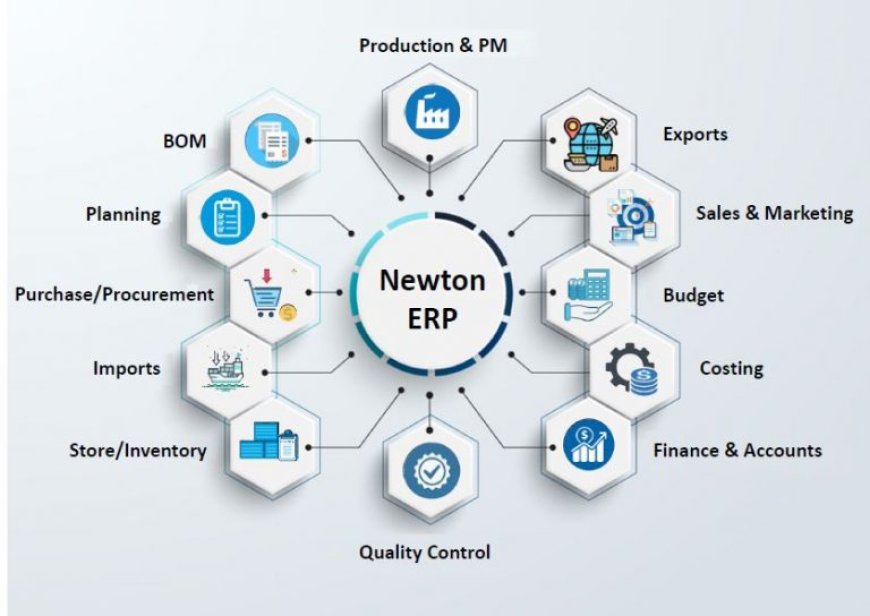What Is ERP? | Newton Software
Transform your manufacturing with our ERP system. Efficiently manage production, streamline operations, and optimize resource utilization.

What is ERP?
Enterprise Resource Planning (ERP) is a powerful software solution that integrates various business processes into a unified system. It helps organizations manage their core functions such as finance, manufacturing, supply chain, human resources, and more. ERP systems enable businesses to automate processes, streamline operations, and improve decision-making. Newton ERP Software, known for its efficiency and versatility, is designed to help companies optimize their operations by offering a seamless solution that brings together all aspects of a business.
Definition of Enterprise Resource Planning (ERP)
Enterprise Resource Planning (ERP) refers to the process of using software to manage and automate key business functions across an organization. By consolidating information from various departments—like finance, production, and customer relations—ERP software helps improve productivity, efficiency, and accuracy. Newton ERP Software stands out as a comprehensive platform that caters to the specific needs of different industries.
What is an ERP System?
An ERP system is a centralized software platform designed to integrate core business processes. It provides real-time insights, improves communication between departments, and enables better decision-making through data analytics. Newton ERP is particularly adept at managing these functions, ensuring that businesses remain agile and competitive in today’s fast-paced environment.
What’s the Difference Between ERP and Financials?
While ERP systems cover a wide range of business processes, financial systems are specifically focused on managing financial transactions and reporting. An ERP system, such as Newton ERP, includes financial modules but extends far beyond accounting to incorporate other functions like supply chain management, human resources, and procurement. The key difference is that ERP systems provide a more holistic view of the organization, helping to optimize not just finances but every operational aspect.
ERP Fundamentals
ERP fundamentals include the integration of business processes, automation of repetitive tasks, and centralized data management. These core features help businesses eliminate manual processes, reduce errors, and enhance collaboration between departments. Newton ERP ensures that these fundamentals are delivered efficiently, offering scalable solutions that can grow with the business.
The Business Value of ERP
The business value of ERP lies in its ability to streamline operations, reduce costs, and provide valuable insights. With Newton ERP, businesses can improve their responsiveness to market changes, reduce operational inefficiencies, and boost overall productivity. The platform’s ability to unify data across departments means decision-makers have access to accurate, up-to-date information that drives better business outcomes.
A Brief History of ERP
ERP systems have evolved from early software programs designed to manage inventory and production in manufacturing. Over time, they have expanded to encompass other areas like finance, HR, and customer service. Newton ERP represents the latest iteration of this evolution, offering cloud-based solutions that are more flexible and cost-effective than traditional on-premises systems.
ERP Deployment Models: From On-Premises to the Cloud
ERP systems can be deployed on-premises, in the cloud, or through a hybrid model. On-premises ERP solutions require businesses to host and manage the software on their own servers, while cloud-based ERP is hosted by a provider and accessed via the internet. Newton ERP offers both deployment models, allowing businesses to choose the best option for their needs, with a growing trend towards cloud-based solutions.
Cloud ERP—A New ERP Delivery Model
Cloud ERP represents a new delivery model where the software is hosted and managed by a third-party provider. This offers numerous benefits, including lower upfront costs, scalability, and remote accessibility. Newton ERP leverages cloud technology to provide businesses with a cost-effective, easy-to-use platform that can be accessed from anywhere, offering real-time data insights and robust security features.
7 Reasons to Move to an ERP Cloud Solution
-
Readily adopt new and evolving SaaS technologies: Cloud ERP allows businesses to easily adopt new technologies and updates without the need for complex IT infrastructure.
-
Extend the value of your existing ERP system: Cloud solutions can enhance the functionality of your current ERP system, offering new features and integrations.
-
Access new technologies: Cloud ERP provides access to cutting-edge tools, including AI, machine learning, and advanced analytics.
-
Reduce third-party dependencies: With cloud ERP, businesses can manage their own infrastructure, reducing reliance on external vendors.
-
Evolve your financial systems: Cloud solutions allow for the continuous improvement of financial processes and reporting.
-
More robust security resources: Cloud ERP providers offer top-tier security protocols, ensuring that data is safe and compliant.
-
Attract in-demand talent: Modern cloud ERP systems like Newton ERP are attractive to top talent, who seek out companies that leverage the latest technology.
Get Started with Newton ERP
Newton ERP is an ideal solution for businesses looking to streamline their operations, improve decision-making, and increase overall efficiency. Its flexible deployment options, advanced features, and industry-specific capabilities make it the perfect choice for businesses of all sizes. Whether you're moving from a legacy system or adopting ERP for the first time, Newton ERP is ready to help you transform your operations.
ERP FAQs
1. What industries benefit from ERP?
Newton ERP serves a variety of industries including manufacturing, construction, retail, and healthcare.
2. Is cloud ERP secure?
Yes, Newton ERP offers robust security features to protect your data.
3. How long does ERP implementation take?
The timeline varies depending on the complexity of the system and business needs.
What's Your Reaction?
 Like
0
Like
0
 Dislike
0
Dislike
0
 Love
0
Love
0
 Funny
0
Funny
0
 Angry
0
Angry
0
 Sad
0
Sad
0
 Wow
0
Wow
0














































